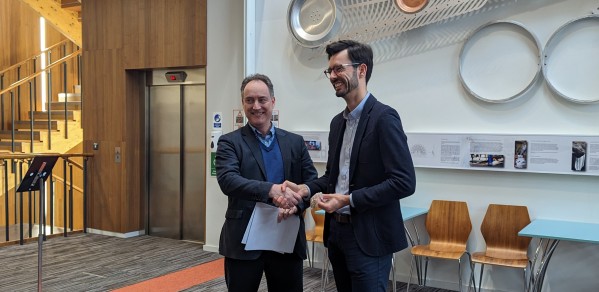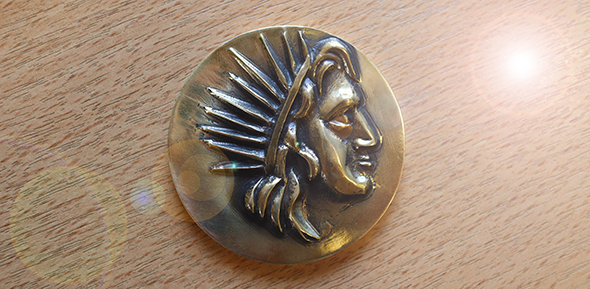
The winner of the Department’s Helios Prize – awarded for graduate research in sustainable energy or energy efficiency – has been announced.
The Helios prize is made possible thanks to a generous donation from Cambridge alumnus John Firth. He approached the Department specifically to set up the prize in honour of graduate work in sustainable energy or energy efficiency.
Antoine Koen a PhD student in the Energy, Fluids and Turbomachinery division accepted a cash prize and a brass medal depicting the Greek sun god, Helios, for his paper: A low-temperature glide cycle for pumped thermal energy storage.
Antoine summarises his paper below.
"Due to the rapid growth of variable renewable power and the challenge of intermittency, electricity grids will require significantly more energy storage capacity than what they have today. My PhD was about "pumped thermal energy storage", a possible alternative to pumped-hydro for storing electricity at large scales, without depending on geography: by means of a reversible heat pump/heat engine, electricity is stored as heat in insulated tanks filled with abundant and cheap materials, such as molten salts or rock.
"In this paper, we present a novel form of pumped thermal energy storage in which the thermodynamic cycle exploits the temperature glide exhibited by zeotropic mixtures. The working fluid is a blend of linear alkanes, where the composition is optimised to minimise heat transfer losses and therefore increase round-trip efficiency. While the analysis constitutes a preliminary thermodynamic design, the overall (electricity-to-electricity) round-trip efficiency is promising for this type of system, at around 50% despite the low temperatures compatible with using unpressurised water as the storage fluid. Initial capital cost estimates were also undertaken and imply that the system is best-suited to longer discharge durations, beyond 12 hours."
Antoine now works for Future Cleantech Architects, a European think tank focused on accelerating high-impact innovation in the hard-to-decarbonise sectors. He says "Long duration energy storage is actually one of our key topics, so this is an apt follow-up to my PhD research."
The Helios prize is made possible thanks to a generous donation from Cambridge alumnus John Firth. He approached the Department specifically to set up the prize in honour of graduate work in sustainable energy or energy efficiency, and asked that the prize be named after Helios, because the world’s renewable energy is fundamentally driven by solar energy.
The medal itself was crafted by Alistair Ross, who was at the time the Manager of Design and Technical Services at the Department of Engineering, who machined it on-site using a 3D pantograph, drawing inspiration for the design from a Helios coin loaned to him by the Fitzwilliam Museum, believed to date from the 2nd to 1st century BC.
There are a number of University academic prize competitions which may be of interest to graduate students within the Department of Engineering. Further details can be found on the graduate studies website.

Philanthropic contributions to the Department are immensely helpful and appreciated because they provide us with the means to realise exciting ambitions for our research and teaching that otherwise cannot be funded by government grants or commercial sponsorship. To find out how to support the Department in this way, please visit this page.

